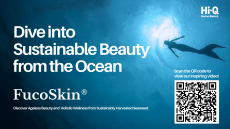Simplifying R&D: tech solutions for faster and more efficient NPD

The increased pressures to quickly get new products on the market, combined with never-ending regulations changes and demand for sustainability transparency throughout the supply chain, means that many R&D professionals are working longer hours to meet these needs.
Of course, there’s a lot to consider when creating a brand new beauty or personal care product. You need inventiveness in terms of product claims, composition and application properties, balanced out with the assurances of repeatable manufacturing, product stability, microbiological purity/safety of the product application, along with ensuring there's evidence of the claimed effect.
It's no wonder that a plethora of tech solutions have recently launched to assist R&D experts in their role.
R&D assistant tools to futureproof products
One such tool is CosmetoSAFE Assist, a proprietary tool to support the work of technologists, product documentation specialists, regulatory departments, and product managers.
CosmetoSAFE claims the tool can help professionals halve the time they spend on cosmetic product documentation by automating product documentation (PIF), concentration calculations or price calculations, making the management of formulations, raw material documentation and related information more efficient; assessing compliance with the requirements for marketing statements; and enabling the tracking of blacklists and information on banned substances.
Meanwhile, Sahas Dendukuri, who was previously an AI researcher at Apple and the University of Michigan, has recently built a new AI-powered software called Cosmex, which is designed to help cosmetic chemists and manufacturers formulate safer products faster.
The AI software tool for cosmetic chemists, formulators, brands and contract manufacturers is designed to instantly validate cosmetic product formulas against numerous regulatory and retailer standards.
According to Dendukuri, it can greatly enhance productivity by screening multiple targeted regulatory standards in the US and EU, as well as retailer Clean Beauty standards from the likes of Sephora, Ulta and Target.
Users enter the cosmetic ingredient and percentages then select the standards to immediately determine if the formula is regulatory and retailer-standard compliant. The tool screens a data set of over 30,000 cosmetic ingredients and will also instantly flag any problematic ingredients and percentages if the formulation is not compliant and will provide information on the issues and recommended corrective actions.
Dendukuri believes that using a tool like this will result in increased transparency for the industry. “Companies will be able to get a much better understanding of regulations and clean beauty standards and how their products stack up against them,” he explained.
“The ease of checking requirements across multiple countries and retailers at once also means that companies can more easily future proof their products. They can think about launching their products in multiple retailers and regions from the beginning rather than having to reformulate down the line when expanding their presence,” he continued.
“MoCRA is something the industry is tracking closely and we've gotten a lot of requests for tooling around it. For that reason, we're launching a new module on Cosmex this month that'll help with product listing and adverse event reporting with the FDA.”
P&G: using AI software for scent development
Beauty and personal care multinational Procter & Gamble recently announced that is using Moodify White – an AI-based fragrance design software solution – for fragrance development.
The business has started to harness Moodify's capabilities for malodour control based on digital scent creation, marking a huge shift for the company to use AI technology to enhance its product development, design and speed to market.
Jerry Porter, Chief R&D and Innovation Officer, Fabric & Home Care, Flavour & Fragrances at Procter & Gamble said the decision was: “a significant step in our digital transformation agenda, emphasising the use of digital tools to improve the use of fragrance in products.”
Meanwhile, Univar Solutions has just launched BeautyLAB this week – a lab-focused global initiative that was developed to identify solutions to today’s formulation challenges. BeautyLAB’s technical experts use ingredients from its suppliers to help customers better understand product efficacy, quality, formulation challenges, and more. The company has also created special digital content on its website and channels to help its customers and suppliers navigate the complex world of beauty and support product development needs.
AI tools can support ESG policies
In an era of heightened environmental awareness and evolving ESG priorities, R&D experts must also integrate environmentally friendly, ethical practices and transparent governance to meet consumers' wants and needs.
One such tool that can help with this is MaterialsZone, which can be used at the R&D stages. The platform incorporates AI and claims to help researchers reduce the number of trial-and-error experiments that often result in unnecessary waste, for a more efficient R&D process and a shorter time to market for new products
According to its CEO and co-founder, Dr Assaf Anderson, by incorporating ESG from the R&D stages, businesses will be able to create a ripple effect and reduce the environmental footprint of the entire manufacturing industry significantly.
Another example of a tool for ESG purposes is BASF’s D’lite, which claims to help simplify sustainability work in the laboratory and save time when repositioning in the market. The digital service is constantly being developed and supplemented with new components that enable formulators to efficiently develop sustainable products.
BASF has integrated the Product Carbon Footprints (PCF) of its personal care portfolio into the digital service to help customers gain insights into the total greenhouse gas emissions generated by the products they purchase from the ingredients’ supplier. Its PCF calculations are based on greenhouse gas emissions from its own plants, as well as high-quality average data for purchased raw materials and purchased energy using a methodology that’s in line with the relevant international standard ISO 14067:2018.
It also includes various sustainability-related aspects to offer its customers the transparency they need to design formulations in line with the label from the outset, as well as reports on certifications such as EU Ecolabel, COSMOS and NATRUE.




























